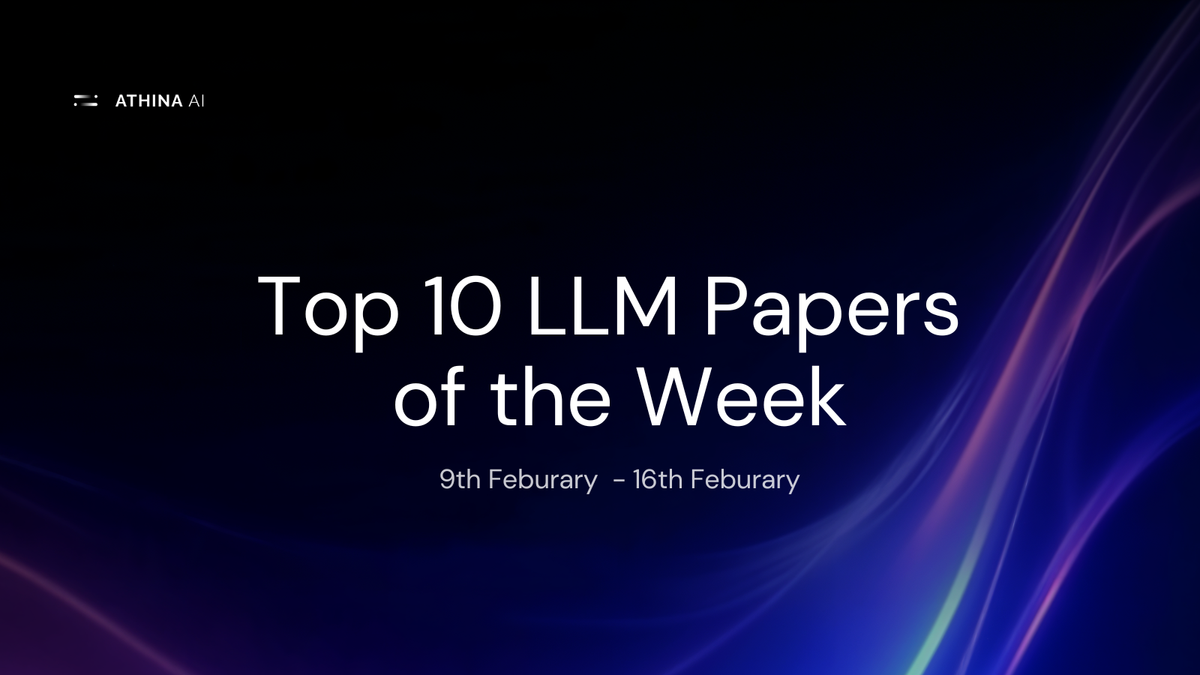Top 10 LLM Papers of the Week

As AI research pushes forward, new breakthroughs are redefining how intelligent systems reason, retrieve information, and interact with their environments. This week, We explore 10 cutting-edge research papers that tackle key challenges in AI Agents, Retrieval-Augmented Generation (RAG), and Benchmarking.
From enhancing multi-agent collaboration to optimizing retrieval efficiency and evaluating LLM robustness, these Papers offer critical insights into the future of AI. Let’s dive in.
1) Knowledge Graph-Guided Retrieval Augmented Generation
This paper introduces KG2RAG, a Knowledge Graph-Guided Retrieval-Augmented Generation framework that enhances traditional RAG methods by incorporating fact-level relationships between retrieved chunks.
Unlike standard semantic-based retrieval, KG2RAG expands and organizes retrieved information using knowledge graphs, ensuring better coherence and diversity. Experiments on the HotpotQA dataset show that KG2RAG improves both response quality and retrieval accuracy compared to existing RAG approaches.
Why it Matters:
By leveraging knowledge graphs, KG2RAG reduces hallucinations in LLM responses and enhances the contextual relevance of retrieved information, making AI-generated content more reliable and informative.
2) Fairness in Multi-Agent AI: A Unified Framework for Ethical and Equitable Autonomous Systems
This paper surveys fairness in decentralized multi-agent AI systems and proposes a novel framework treating fairness as an emergent property of agent interactions.
It integrates fairness constraints, bias mitigation, and incentive mechanisms to align agent behaviors with societal values while maintaining efficiency. Empirical validation shows that fairness constraints lead to more equitable decision-making.
Why it Matters: This work bridges AI ethics and system design, providing a foundation for transparent, accountable, and socially responsible multi-agent AI systems that mitigate bias and inefficiencies.
3) Preventing Rogue Agents Improves Multi-Agent Collaboration
This paper addresses the challenge of rogue agents in multi-agent systems, which can cause system failure by making premature decisions. The authors propose a monitoring approach that detects potential agent errors before they occur and intervenes to prevent failures.
Their method is tested in the WhoDunitEnv and GovSim environments, showing performance improvements of up to 17.4% and 20%, respectively, while successfully identifying and mitigating agent confusion.
Why it Matters:
By proactively detecting and preventing errors in multi-agent systems, this approach enhances collaboration, reliability, and robustness, making such systems more effective in real-world applications.
4) CODESIM: Multi-Agent Code Generation and Problem Solving through Simulation-Driven Planning and Debugging
This paper introduces CODESIM, a multi-agent framework for code generation that enhances program synthesis through planning, coding, and debugging.
Unlike traditional methods relying on external tools, CODESIM employs a human-like perception approach, using step-by-step input/output simulation for plan verification and internal debugging.
Why it Matters:
By improving the accuracy and reliability of AI-generated code, CODESIM advances automated programming, reducing reliance on external debuggers and enhancing problem-solving efficiency in software development.
5) Forget What You Know about LLMs Evaluations - LLMs are Like a Chameleon
This paper introduces C-BOD, a meta-evaluation framework that detects overfitting in LLMs by systematically rephrasing benchmark prompts while preserving meaning.
Tested on MMLU with 26 LLMs, C-BOD reveals that models with higher accuracy are more sensitive to rephrasings, suggesting reliance on superficial cues rather than true understanding. Its dataset- and model-agnostic design makes it a valuable tool for improving LLM robustness.
Why it Matters:
C-BOD challenges the reliance on benchmark scores and promotes more resilient, generalizable LLMs, ensuring AI models perform reliably beyond memorized patterns.
6) BenchMAX: A Comprehensive Multilingual Evaluation Suite for Large Language Models
This paper introduces BenchMAX, a multilingual benchmark designed to evaluate advanced LLM capabilities such as reasoning, instruction following, and code generation across 17 languages.
Each dataset sample is machine-translated and independently annotated by three native speakers to ensure quality. Experiments reveal significant performance gaps between languages that cannot be resolved by simply scaling model size.
Why it Matters:
BenchMAX provides a rigorous multilingual evaluation framework, promoting the development of more equitable and effective LLMs across diverse linguistic communities.
7) Single-Agent Planning in a Multi-Agent System: A Unified Framework for Type-Based Planners
This paper presents a unified theoretical framework for multi-agent planning, balancing exploration and exploitation when an agent has no prior knowledge of opponents.
The framework spans exact to approximate planners, with experiments on multi-agent route planning (up to 50 agents) evaluating 13 planners. Notably, "safe-agents" perform well despite their simplicity, offering practical insights for decision-making in multi-agent environments.
Why it Matters:
This framework enhances multi-agent planning strategies, with potential applications in robotics, autonomous systems, and mechanism design, improving adaptability in uncertain environments.
8) Commercial LLM Agents Are Already Vulnerable to Simple Yet Dangerous Attacks
This paper explores security vulnerabilities in LLM-powered agents, which extend beyond standalone models due to their integration with memory, retrieval, web access, and APIs.
The authors present a taxonomy of attacks and demonstrate how easily exploitable these agents are through practical attacks on commercial and open-source systems, requiring no ML expertise.
Why it Matters:
As LLMs become central to real-world applications, understanding and mitigating security risks in agentic pipelines is crucial to preventing data leaks and adversarial manipulation.
9) Ask in Any Modality: A Comprehensive Survey on Multimodal Retrieval-Augmented Generation (RAG)
This survey explores Multimodal Retrieval-Augmented Generation (RAG), which integrates text, images, audio, and video to improve LLM grounding. It analyzes datasets, evaluation metrics, training strategies, and key challenges like cross-modal alignment.
The paper also reviews innovations in retrieval, fusion, augmentation, and generation, offering insights into robustness and future research directions.
Why it Matters:
Multimodal RAG enhances AI’s ability to process diverse real-world information, paving the way for more accurate, context-aware, and dynamically updated AI systems.
10) ParetoRAG: Leveraging Sentence-Context Attention for Robust and Efficient Retrieval-Augmented Generation
This paper introduces ParetoRAG, an unsupervised framework that improves RAG systems by refining retrieval at the sentence level using the Pareto principle.
It dynamically reweights key content while maintaining coherence, enhancing both retrieval precision and generation quality without extra training or API usage. Empirical results confirm its effectiveness across various datasets, LLMs, and retrievers.
Why it Matters:
ParetoRAG optimizes retrieval efficiency and relevance, making RAG systems more precise and robust, ultimately improving the reliability of AI-generated content.
Conclusion
As AI research advances, this week’s top papers push the boundaries of multi-agent systems, retrieval-augmented generation, and benchmarking methodologies. From improving collaboration in AI agents to refining retrieval precision and robustness, these studies showcase the innovations shaping the next generation of intelligent systems. As the field evolves, these breakthroughs will play a crucial role in making AI more efficient, reliable, and adaptable.
For more insights, check out the Top 10 Papers on AI Agents and RAG from January here
Ready to enhance your AI development? Discover Athina AI—your go-to platform for building, testing, and monitoring AI-driven features.



